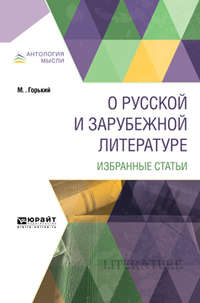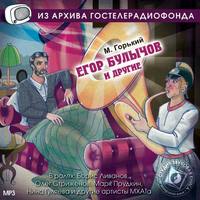 полная версия
полная версияThe Man Who Was Afraid
“Mind me as an older sister of yours. I have lived, I know men. I have seen a great deal in my life! Choose your companions with care, for there are people just as contagious as a disease. At first you cannot tell them even when you see them; he looks to be a man like everybody else, and, suddenly, without being aware of it yourself, you will start to imitate him in life. You look around – and you find that you have contracted his scabs. I myself have lost everything on account of a friend. I had a husband and two children. We lived well. My husband was a clerk at a volost.” She became silent and looked for a long time at the water, which was stirred by the vessel. Then she heaved a sigh and spoke to him again:
“May the Holy Virgin guard you from women of my kind – be careful. You are tender as yet, your heart has not become properly hardened. And women are fond of such as you – strong, handsome, rich. And most of all beware of the quiet women. They stick to a man like blood-suckers, and suck and suck. And at the same time they are always so kind, so gentle. They will keep on sucking your juice, but will preserve themselves. They’ll only break your heart in vain. You had better have dealings with those that are bold, like myself. These live not for the sake of gain.”
And she was indeed disinterested. In Perm Foma purchased for her different new things and what-not. She was delighted, but later, having examined them, she said sadly:
“Don’t squander your money too freely. See that your father does not get angry. I love you anyway, without all this.”
She had already told him that she would go with him only as far as Kazan, where she had a married sister. Foma could not believe that she would leave him, and when, on the eve of their arrival at Kazan, she repeated her words, he became gloomy and began to implore her not to forsake him.
“Do not feel sorry in advance,” she said. “We have a whole night before us. You will have time to feel sorry when I bid you good-bye, if you will feel sorry at all.”
But he still tried to persuade her not to forsake him, and, finally – which was to be expected – announced his desire to marry her.
“So, so!” and she began to laugh. “Shall I marry you while my husband is still alive? My darling, my queer fellow! You have a desire to marry, eh? But do they marry such women as I am? You will have many, many mistresses. Marry then, when you have overflowed, when you have had your fill of all sweets and feel like having rye bread. Then you may marry! I have noticed that a healthy man, for his own peace, must not marry early. One woman will not be enough to satisfy him, and he’ll go to other women. And for your own happiness, you should take a wife only when you know that she alone will suffice for you.”
But the more she spoke, the more persistent Foma became in his desire not to part with her.
“Just listen to what I’ll tell you,” said the woman, calmly. “A splinter of wood is burning in your hand, and you can see well even without its light – you had better dip it into water, so that there will be no smell of smoke and your hand will not be burned.”
“I do not understand your words.”
“Do understand. You have done me no wrong, and I do not wish to do you any. And, therefore, I am going away.”
It is hard to say what might have been the result of this dispute if an accident had not interfered with it. In Kazan Foma received a telegram from Mayakin, who wrote to his godson briefly: “Come immediately on the passenger steamer.” Foma’s heart contracted nervously, and a few hours later, gloomy and pale, his teeth set together, he stood on the deck of the steamer, which was leaving the harbour, and clinging to the rail with his hands, he stared motionlessly into the face of his love, who was floating far away from him together with the harbour and the shore. Pelageya waved her handkerchief and smiled, but he knew that she was crying, shedding many painful tears. From her tears the entire front of Foma’s shirt was wet, and from her tears, his heart, full of gloomy alarm, was sad and cold. The figure of the woman was growing smaller and smaller, as though melting away, and Foma, without lifting his eyes, stared at her and felt that aside from fear for his father and sorrow for the woman, some new, powerful and caustic sensation was awakening in his soul. He could not name it, but it seemed to him as something like a grudge against someone.
The crowd in the harbour blended into a close, dark and dead spot, faceless, formless, motionless. Foma went away from the rail and began to pace the deck gloomily.
The passengers, conversing aloud, seated themselves to drink tea; the porters bustled about on the gallery, setting the tables; somewhere below, on the stern, in the third class, a child was crying, a harmonica was wailing, the cook was chopping something with knives, the dishes were jarring – producing a rather harsh noise. Cutting the waves and making foam, shuddering under the strain and sighing heavily, the enormous steamer moved rapidly against the current. Foma looked at the wide strip of broken, struggling, and enraged waves at the stern of the steamer, and began to feel a wild desire to break or tear something; also to go, breast foremost, against the current and to mass its pressure against himself, against his breast and his shoulders.
“Fate!” said someone beside him in a hoarse and weary voice.
This word was familiar to him: his Aunt Anfisa had often used it as an answer to his questions, and he had invested in this brief word a conception of a power, similar to the power of God. He glanced at the speakers: one of them was a gray little old man, with a kind face; the other was younger, with big, weary eyes and with a little black wedge-shaped beard. His big gristly nose and his yellow, sunken cheeks reminded Foma of his godfather.
“Fate!” The old man repeated the exclamation of his interlocutor with confidence, and began to smile. “Fate in life is like a fisherman on the river: it throws a baited hook toward us into the tumult of our life and we dart at it with greedy mouths. Then fate pulls up the rod – and the man is struggling, flopping on the ground, and then you see his heart is broken. That’s how it is, my dear man.”
Foma closed his eyes, as if a ray of the sun had fallen full on them, and shaking his head, he said aloud:
“True! That is true!”
The companions looked at him fixedly: the old man, with a fine, wise smile; the large-eyed man, unfriendly, askance. This confused Foma; he blushed and walked away, thinking of Fate and wondering why it had first treated him kindly by giving him a woman, and then took back the gift from him, so simply and abusively? And he now understood that the vague, caustic feeling which he carried within him was a grudge against Fate for thus sporting with him. He had been too much spoiled by life, to regard more plainly the first drop of poison from the cup which was just started, and he passed all the time of the journey without sleep, pondering over the old man’s words and fondling his grudge. This grudge, however, did not awaken in him despondency and sorrow, but rather a feeling of anger and revenge.
Foma was met by his godfather, and to his hasty and agitated question, Mayakin, his greenish little eyes flashing excitedly, said when he seated himself in the carriage beside his godson:
“Your father has grown childish.”
“Drinking?”
“Worse – he has lost his mind completely.”
“Really? Oh Lord! Tell me.”
“Don’t you understand? A certain lady is always around him.”
“What about her?” exclaimed Foma, recalling his Pelageya, and for some reason or other his heart was filled with joy.
“She sticks to him and – bleeds him.”
“Is she a quiet one?”
“She? Quiet as a fire. Seventy-five thousand roubles she blew out of his pocket like a feather!”
“Oh! Who is she?”
“Sonka Medinskaya, the architect’s wife.”
“Great God! Is it possible that she – Did my father – Is it possible that he took her as his sweetheart?” asked Foma, with astonishment, in a low voice.
His godfather drew back from him, and comically opening his eyes wide, said convincedly:
“You are out of your mind, too! By God, you’re out of your mind! Come to your senses! A sweetheart at the age of sixty-three! And at such a price as this. What are you talking about? Well, I’ll tell this to Ignat.”
And Mayakin filled the air with a jarring, hasty laughter, at which his goat-like beard began to tremble in an uncomely manner. It took Foma a long time to obtain a categorical answer; the old man, contrary to his habit, was restless and irritated; his speech, usually fluent, was now interrupted; he was swearing and expectorating as he spoke, and it was with difficulty that Foma learned what the matter was. Sophya Pavlovna Medinskaya, the wealthy architect’s wife, who was well known in the city for her tireless efforts in the line of arranging various charitable projects, persuaded Ignat to endow seventy-five thousand roubles for the erection of a lodging-house in the city and of a public library with a reading-room. Ignat had given the money, and already the newspapers lauded him for his generosity. Foma had seen the woman more than once on the streets; she was short; he knew that she was considered as one of the most beautiful women in the city, and that bad rumours were afoot as to her behaviour.
“Is that all?” exclaimed Foma, when his godfather concluded the story. “And I thought God knows what!”
“You? You thought?” cried Mayakin, suddenly grown angry. “You thought nothing, you beardless youngster!”
“Why do you abuse me?” Foma said.
“Tell me, in your opinion, is seventy-five thousand roubles a big sum or not?”
“Yes, a big sum,” said Foma, after a moment’s thought.
“Ah, ha!”
“But my father has much money. Why do you make such a fuss about it?”
Yakov Tarasovich was taken aback. He looked into the youth’s face with contempt and asked him in a faint voice:
“And you speak like this?”
“I? Who then?”
“You lie! It is your young foolishness that speaks. Yes! And my old foolishness – brought to test a million times by life – says that you are a young dog as yet, and it is too early for you to bark in a basso.”
Foma hearing this, had often been quite provoked by his godfather’s too picturesque language.
Mayakin always spoke to him more roughly than his father, but now the youth felt very much offended by the old man and said to him reservedly, but firmly:
“You had better not abuse me without reflection, for I am no longer a small child.”
“Come, come!” exclaimed Mayakin, mockingly lifting his eyebrows and squinting.
This roused Foma’s indignation. He looked full into the old man’s eyes and articulated with emphasis:
“And I am telling you that I don’t want to hear any more of that undeserved abuse of yours. Enough!”
“Mm! So-o! Pardon me.”
Yakov Tarasovich closed his eyes, chewed a little with his lips, and, turning aside from his godson, kept silent for awhile. The carriage turned into a narrow street, and, noticing from afar the roof of his house, Foma involuntarily moved forward. At the same time Mayakin asked him with a roguish and gentle smile:
“Foma! Tell me – on whom you have sharpened your teeth? Eh?”
“Why, are they sharp?” asked Foma, pleased with the manner in which Mayakin now regarded him.
“Pretty good. That’s good, dear. That’s very good! Your father and I were afraid lest you should be a laggard. Well, have you learned to drink vodka?”
“I drank it.”
“Rather too soon! Did you drink much of it?”
“Why much?”
“Does it taste good?”
“Not very.”
“So. Never mind, all this is not so bad. Only you are too outspoken. You are ready to confess all your sins to each and every pope that comes along. You must consider it isn’t always necessary to do that. Sometimes by keeping silent you both please people and commit no sins. Yes. A man’s tongue is very seldom sober. Here we are. See, your father does not know that you have arrived. Is he home yet, I wonder?”
He was at home: his loud, somewhat hoarse laughter was heard from the open windows of the rooms. The noise of the carriage, which stopped at the house, caused Ignat to look out of the window, and at the sight of his son he cried out with joy:
“Ah! You’ve come.”
After a while he pressed Foma to his breast with one hand, and, pressing the palm of his other hand against his son’s forehead, thus bending his head back, he looked into his face with beaming eyes and spoke contentedly:
“You are sunburnt. You’ve grown strong. You’re a fine fellow! Madame! How’s my son? Isn’t he fine?”
“Not bad looking,” a gentle, silver voice was heard. Foma glanced from behind his father’s shoulder and noticed that a slender woman with magnificent fair hair was sitting in the front corner of the room, resting her elbows on the table; her dark eyes, her thin eyebrows and plump, red lips strikingly defined on her pale face. Behind her armchair stood a large philodendron-plant whose big, figured leaves were hanging down in the air over her little golden head.
“How do you do, Sophya Pavlovna,” said Mayakin, tenderly, approaching her with his hand outstretched. “What, are you still collecting contributions from poor people like us?”
Foma bowed to her mutely, not hearing her answer to Mayakin, nor what his father was saying to him. The lady stared at him steadfastly and smiled to him affably and serenely. Her childlike figure, clothed in some kind of dark fabric, was almost blended with the crimson stuff of the armchair, while her wavy, golden hair and her pale face shone against the dark background. Sitting there in the corner, beneath the green leaves, she looked at once like a flower, and like an ikon.
“See, Sophya Pavlovna, how he is staring at you. An eagle, eh?” said Ignat.
Her eyes became narrower, a faint blush leaped to her cheeks, and she burst into laughter. It sounded like the tinkling of a little silver bell. And she immediately arose, saying:
“I wouldn’t disturb you. Good-bye!”
When she went past Foma noiselessly, the scent of perfume came to him, and he noticed that her eyes were dark blue, and her eyebrows almost black.
“The sly rogue glided away,” said Mayakin in a low voice, angrily looking after her.
“Well, tell us how was the trip? Have you squandered much money?” roared Ignat, pushing his son into the same armchair where Medinskaya had been sitting awhile before. Foma looked at him askance and seated himself in another chair.
“Isn’t she a beautiful young woman, eh?” said Mayakin, smiling, feeling Foma with his cunning eyes. “If you keep on gaping at her she will eat away all your insides.”
Foma shuddered for some reason or other, and, saying nothing in reply, began to tell his father about the journey in a matter-of-fact tone. But Ignat interrupted him:
“Wait, I’ll ask for some cognac.”
“And you are keeping on drinking all the time, they say,” said Foma, disapprovingly.
Ignat glanced at his son with surprise and curiosity, and asked:
“Is this the way to speak to your father?”
Foma became confused and lowered his head.
“That’s it!” said Ignat, kind-heartedly, and ordered cognac to be brought to him.
Mayakin, winking his eyes, looked at the Gordyeeffs, sighed, bid them good-bye, and, after inviting them to have tea with him in his raspberry garden in the evening, went away.
“Where is Aunt Anfisa?” asked Foma, feeling that now, being alone with his father, he was somewhat ill at ease.
“She went to the cloister. Well, tell me, and I will have some cognac.”
Foma told his father all about his affairs in a few minutes and he concluded his story with a frank confession:
“I have spent much money on myself.”
“How much?”
“About six hundred roubles.”
“In six weeks! That’s a good deal. I see as a clerk you’re too expensive for me. Where have you squandered it all?”
“I gave away three hundred puds of grain.”
“To whom? How?”
Foma told him all about it.
“Hm! Well, that’s all right!” Ignat approved. “That’s to show what stuff we are made of. That’s clear enough – for the father’s honour – for the honour of the firm. And there is no loss either, because that gives a good reputation. And that, my dear, is the very best signboard for a business. Well, what else?”
“And then, I somehow spent more.”
“Speak frankly. It’s not the money that I am asking you about – I just want to know how you lived there,” insisted Ignat, regarding his son attentively and sternly.
“I was eating, drinking.” Foma did not give in, bending his head morosely and confusedly.
“Drinking vodka?”
“Vodka, too.”
“Ah! So. Isn’t it rather too soon?”
“Ask Yefim whether I ever drank enough to be intoxicated.”
“Why should I ask Yefim? You must tell me everything yourself. So you are drinking? I don’t like it.”
“But I can get along without drinking.”
“Come, come! Do you want some cognac?”
Foma looked at his father and smiled broadly. And his father answered him with a kindly smile:
“Eh, you. Devil! Drink, but look out – know your business. What can you do? A drunkard will sleep himself sober, a fool – never. Let us understand this much at least, for our own consolation. And did you have a good time with girls, too? Be frank! Are you afraid that I will beat you, or what?”
“Yes. There was one on the steamer. I had her there from Perm to Kazan.”
“So,” Ignat sighed heavily and said, frowning: “You’ve become defiled rather too soon.”
“I am twenty years old. And you yourself told me that in your days fellows married at the age of fifteen,” replied Foma, confused.
“Then they married. Very well, then, let us drop the subject. Well, you’ve had dealings with a woman. What of it? A woman is like vaccination, you cannot pass your life without her. As for myself, I cannot play the hypocrite. I began to go around with women when I was younger than you are now. But you must be on your guard with them.”
Ignat became pensive and was silent for a long time, sitting motionless, his head bent low on his breast.
“Listen, Foma,” he started again, sternly and firmly. “I shall die before long. I am old. Something oppresses my breast. I breathe with difficulty. I’ll die. Then all my affairs will fall on your shoulders. At first your godfather will assist you – mind him! You started quite well; you attended to everything properly; you held the reins firmly in your hands. And though you did squander a big sum of money, it is evident that you did not lose your head. God grant the same in the future. You should know this: business is a living, strong beast; you must manage it ably; you must put a strong bridle on it or it will conquer you. Try to stand above your business. Place yourself so that it will all be under your feet; that each little tack shall be visible to you.”
Foma looked at his father’s broad chest, heard his heavy voice and thought to himself:
“Oh, but you won’t die so soon!”
This thought pleased him and awakened in him a kind, warm feeling for his father.
“Rely upon your godfather. He has enough common sense in his head to supply the whole town with it. All he lacks is courage, or he would have risen high. Yes, I tell you my days on earth are numbered. Indeed, it is high time to prepare myself for death; to cast everything aside; to fast, and see to it that people bear me good-will.”
“They will!” said Foma with confidence.
“If there were but a reason why they should.”
“And the lodging-house?”
Ignat looked at his son and began to laugh.
“Yakov has had time to tell it to you already! The old miser. He must have abused me?”
“A little.” Foma smiled.
“Of course! Don’t I know him?”
“He spoke of it as though it were his own money.”
Ignat leaned back in his chair and burst into still louder laughter.
“The old raven, eh? That’s quite true. Whether it be his own money or mine, it is all the same to him. There he is trembling now. He has an aim in view, the bald-headed fellow. Can you tell me what it is?”
Foma thought awhile and said:
“I don’t know.”
“Eh, you’re stupid. He wants to tell our fortunes.”
“How is that?”
“Come now, guess!”
Foma looked at his father and – guessed it. His face became gloomy, he slightly raised himself from the armchair and said resolutely:
“No, I don’t want to. I shall not marry her!”
“Oh? Why so? She is a strong girl; she is not foolish; she’s his only child.”
“And Taras? The lost one? But I – I don’t want to at all!”
“The lost one is gone, consequently it is not worthwhile speaking of him. There is a will, dear, which says: ‘All my movable and real estates shall go to my daughter, Lubov.’ And as to the fact that she is your godfather’s daughter, we’ll set this right.”
“It is all the same,” said Foma, firmly. “I shall not marry her!”
“Well, it is rather early to speak of it now! But why do you dislike her so much?”
“I do not like such as she is.”
“So-o! Just think of it! And which women are more to your liking, sir, may I ask?”
“Those that are more simple. She’s always busy with her Gymnasium students and with her books. She’s become learned. She’ll be laughing at my expense,” said Foma, emotionally.
“That is quite true. She is too bold. But that is a trifle. All sorts of rust can be removed if you try to do it. That’s a matter for the future. And your godfather is a clever old man. His was a peaceful, sedentary life; sitting in one place he gave a thought to everything. It is worthwhile listening to him, for he can see the wrong side of each and every worldly affair. He is our aristocrat – descending from Mother Yekaterina – ha, ha! He understands a great deal about himself. And as his stem was cut off by Taras, he decided to put you in Taras’s place, do you see?”
“No, I’d rather select my place myself,” said Foma, stubbornly.
“You are foolish as yet.” Ignat smiled in reply to his son’s words.
Their conversation was interrupted by the arrival of Aunt Anfisa.
“Foma! You’ve come,” she cried out, somewhere behind the doors. Foma rose and went to meet her, with a gentle smile.
Again his life streamed on slowly, calmly, monotonously. Again the Exchange and his father’s instructions. Retaining a kindly sarcastic and encouraging tone in his relation toward his son, Ignat began to treat him more strictly. He censured him for each and every trifle and constantly reminded him that he brought him up freely; that he was never in his way and that he never beat him.
“Other fathers beat fellows like yourself with logs of wood. And I never even touched you with a finger.”
“Evidently I didn’t deserve it,” said Foma one day, calmly.
Ignat became angry at his son for these words and for the tone.
“Don’t talk so much!” he roared. “You’ve picked up courage because of the softness of my hand. You find an answer to every word I say. Beware; though my hand was soft, it can nevertheless still squeeze you so that tears will gush forth from your heels. You’ve grown up too soon, like a toad-stool, just sprung up from the ground. You have a bad smell already.”
“Why are you so angry at me?” asked Foma, perplexed and offended, when his father chanced to be in a happy frame of mind.
“Because you cannot tolerate it when your father grumbles at you. You’re ready to quarrel immediately.”
“But it is offensive. I have not grown worse than I was before. Don’t I see how others live at my age?”
“Your head wouldn’t fall off from my scolding you. And I scold you because I see there is something in you that is not mine. What it is, I do not know, but I see it is there. And that something is harmful to you.”
These words of Ignat made the son very thoughtful. Foma also felt something strange in himself, something which distinguished him from the youth of his age, but he, too, could not understand what it was. And he looked at himself with suspicion.
Foma liked to be on the Exchange amid the bustle and talk of the sedate people who were making deals amounting to thousands of roubles; the respect with which the less well-to-do tradesmen greeted and spoke to him – to Foma, the son of the millionaire – flattered him greatly. He felt happy and proud whenever he successfully managed some part of his father’s business, assuming all responsibility on his own shoulders, and received a smile of approval from his father for it. There was in him a great deal of ambition, yearning to appear as a grown-up man of business, but – just as before his trip to Perm – he lived as in solitude; he still felt no longing for friends, although he now came in contact everyday with the merchants’ sons of his age. They had invited him more than once to join them in their sprees, but he rather rudely and disdainfully declined their invitations and even laughed at them.









